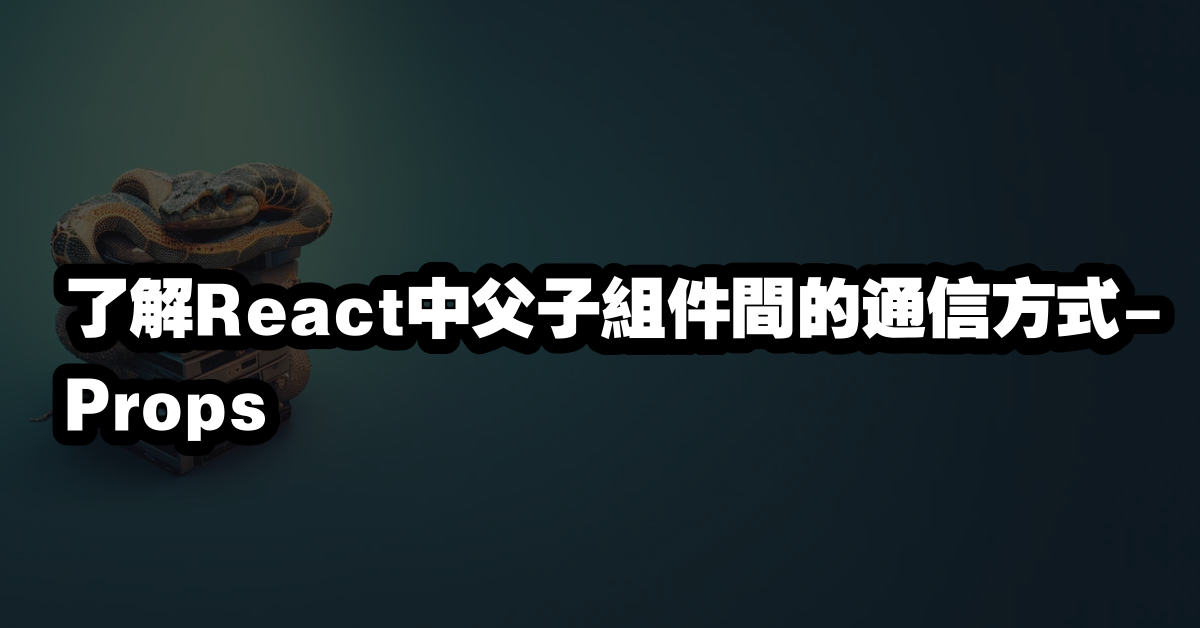
React 是由 Facebook 開發的一個現代 JavaScript 函式庫,專為構建用戶端應用程式而設計。理解 React 中的父子組件通信(Props)是任何 React 開發者必不可少的技能,它使得組件之間能夠高效地傳遞資料。
目錄
什麼是 React 父子組件通信(Props)?
React 父子組件通信是指在父組件與子組件之間傳遞資料的過程。這種方式讓子組件能夠獲取父組件的資料,並根據這些資料來更新自身的狀態或顯示內容。
如何使用 React 父子組件通信(Props)?
使用 Props 來進行父子組件通信的方法非常簡單。以下是一個基本示例:
假設我們有一個父組件 Parent,它擁有一個名為 name 的狀態變數,我們可以將這個變數傳遞給子組件 Child:
class Parent extends React.Component {
constructor(props) {
super(props);
this.state = {
name: 'John'
};
}
render() {
return (
<Child name={this.state.name} />
);
}
}
在子組件 Child 中,我們可以使用 props 來訪問父組件所傳遞的資料:
class Child extends React.Component {
render() {
return (
<p>Hello, my name is {this.props.name}</p>
);
}
}
這樣一來,我們就可以在子組件中使用父組件所傳遞的資料,並將其顯示在網頁上。
錯誤排除提示
在使用 Props 時,開發者可能會遇到以下問題:
- 未正確傳遞 Props:確保父組件中的 Props 名稱與子組件中使用的 Props 名稱一致。
- Props 類型錯誤:在子組件中使用 Props 時,請確認所接收的資料類型正確。
- 未處理 undefined 的 Props:在使用 Props 時,最好加上條件判斷以避免出現 undefined 錯誤。
延伸應用
使用 Props 不僅限於傳遞簡單的字符串或數字,還可以傳遞函數、物件等複雜資料類型。這使得父子組件間的通信更加靈活。例如,父組件可以傳遞一個函數給子組件,子組件可以通過調用這個函數來影響父組件的狀態。
class Parent extends React.Component {
constructor(props) {
super(props);
this.state = { count: 0 };
this.incrementCount = this.incrementCount.bind(this);
}
incrementCount() {
this.setState({ count: this.state.count + 1 });
}
render() {
return (
<Child increment={this.incrementCount} />
);
}
}
class Child extends React.Component {
render() {
return (
<button onClick={this.props.increment}>Increment Count</button>
);
}
}
總結
React 的父子組件通信(Props)是一種強大的資料傳遞工具,可以讓組件之間保持良好的互動。透過簡單的語法,開發者能夠輕鬆地在父子組件間傳遞資料,並根據需要進行更新。掌握 Props 的使用對於成為一名熟練的 React 開發者至關重要。
Q&A(常見問題解答)
如何驗證 Props 的類型?
可以使用 PropTypes 來驗證 Props 的類型,這是一個內建的工具,可以幫助開發者檢查傳遞給組件的 Props 是否符合預期的類型。
可以傳遞 Props 給函數組件嗎?
是的,Props 不僅可以傳遞給類組件,還可以傳遞給函數組件,函數組件會自動接收 Props 作為其參數。
如果不需要更新 Props,是否可以直接在子組件中使用?
可以,子組件可以直接使用 Props,而不必將其存儲在狀態中,但這樣做不會允許子組件自我更新。
—
